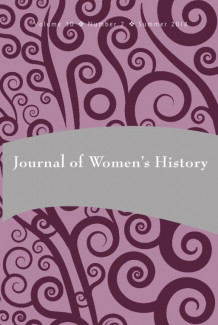
Johns Hopkins UniversityEst. 1876
America’s First Research University
Women and the Global 1970s

Earlier this year, the Journal of Women's History published a cluster of papers focused on issues facing women around the globe in the 1970s. "Women and the Global 1970s" opened the lens to topics from Spain, Australia, the United States and the Middle East. Editors Elisa Camiscioli and Jean H. Quataert from Binghamton University, The State University of New York, joined us for a Q&A about the issue.
What led to the creation of this issue?
This was not a special issue for which we solicited manuscripts on a particular topic. It came about organically: we had a cluster of articles from across the globe that discussed topics situated in 1970s. Sometimes you can read the production queue like tea leaves and see the trends materializing in the field.

Several important themes came to light. Some of the articles discuss women’s claims to bodily sovereignty through birth control and abortion. Others document women’s sexual exploration, including in same-sex partnerships. The rise of modern environmentalism, another key landmark of the 1970s, is present in a number of articles, influencing women’s activism, childbirth practices, and communal living. And some of our authors reflect on the tensions within 1970s global feminism, despite its aspirations to a “global sisterhood.”
How difficult is it to untangle the 1960s and 1970s when tackling articles like the ones in this issue?
Ten years is a woefully small unit of time for historical analysis. So it’s useful to frame the 1970s as an extension of the 1960s, or, in some cases, as a backlash against that decade. Our authors show, for example, that the rights revolution that began in the 1960s was expanded in the 1970s. Many women didn’t experience the sexual freedom and independence that was the hallmark of the 1960s until the years that followed. Abortion rights in the United States and several European countries were not legislated on until the 1970s.
This issue also explores the idea of the 1970s as a repudiation of the previous decade, particularly in the United States with the growth of religious fundamentalism, the rise of the New Right, and an emerging antifeminist movement that framed 1960s freedoms as “anti-family.”
How important was it for this issue to showcase many parts of the world and not just topics from North America?
At the JWH, we always seek to approach historical questions globally, and so this issue includes articles on Australia, Spain, and Egypt as well as the United States. Landmark events of the 1970s are indisputably global, from the emergence of neoliberal responses to economic crises, to the rise of family planning initiatives and women’s healthcare. So too are international affairs, and this issue touches on the Arab-Israeli conflict and the 1975 International Women’s Year Conference in Mexico City.
The comparisons are instructive. For example, an analysis centered on the US and Europe alone might conclude that the increased availability of contraceptive technologies in the 1970s empowered women by preventing unwanted pregnancies. Alissa Walter’s article reveals, however, that women from the lower classes in Egypt rejected government-issued contraceptives and attempted to increase the number of surviving children in their families. She also explains that in the developing world, family planning reflected postcolonial anxieties about the strain that high birthrates placed on state resources, rather than an affirmation of female autonomy or sexual freedom.

There are potential challenges for any scholars writing histories of the recent past, such as the lack of a traditional archive due to privacy laws, copyright protections, or the absence of inventories and finding aids. But this predicament can also be a source of creativity. The historian Heather Ann Thompson has described how the unavailability of documents from state archives on the prison uprising in Attica, New York in 1971 led her to wonderfully rich sources in unexpected places. She won a Pulitzer Prize for her book on that topic.
There are also ethical concerns as historians navigate the principles of conducting oral histories and disseminating the information shared by their subjects, which might cause pain or shame to living people. At the same time, the opportunity to conduct oral histories is one of the great advantages of writing an analysis soon after the events took place. Recent histories can also employ a broad range of digital sources to supplement evidence derived from “paper archives.”
The politics of writing recent histories may be especially contentious for historians of women, gender, and sexuality because contemporary topics offer opportunities to intervene in current debates. In turn, scholars are open to charges—often made in bad faith—of anachronism and bias. But the intellectual platform provided by recent histories also makes them appealing to feminist scholars, and there are no simple answers to the question of whether or how we should disentangle intellectual pursuits from politics.


